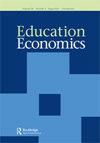成绩预期:过去的表现能在多大程度上预测未来的成绩?
IF 0.9
Q3 Social Sciences
引用次数: 0
摘要
英国学生申请大学的依据是老师预测的考试成绩,而不是实际成绩。这些预测已被证明是不准确的,而且有利于某些群体,这导致了对教师偏见的担忧。我们想知道是否有可能通过使用先前的成就数据和机器学习技术来预测学生的成就,从而提高教师预测的准确性。虽然我们的模型确实导致了教师预测的定量改进,但仍然存在大量的不准确性。我们的模型还低估了成绩优异的公立学校学生和社会经济地位较低的学生,这表明他们的教育轨迹更不稳定。这引发了人们对英国系统中预测使用的质疑。本文章由计算机程序翻译,如有差异,请以英文原文为准。
Grade expectations: how well can past performance predict future grades?
ABSTRACT Students in the UK apply to university with teacher-predicted examination grades, rather than actual results. These predictions have been shown to be inaccurate, and to favour certain groups, leading to concerns about teacher bias. We ask whether it is possible to improve on the accuracy of teachers’ predictions by predicting pupil achievement using prior attainment data and machine learning techniques. While our models do lead to a quantitative improvement on teacher predictions, substantial inaccuracies remain. Our models also underpredict high-achieving state school pupils and low socio-economic status pupils, suggesting they have more volatile education trajectories. This raises questions about the use of predictions in the UK system.
求助全文
通过发布文献求助,成功后即可免费获取论文全文。
去求助
来源期刊

Education Economics
EDUCATION & EDUCATIONAL RESEARCH-
CiteScore
2.00
自引率
8.30%
发文量
38
期刊介绍:
Education Economics is a peer-reviewed journal serving as a forum for debate in all areas of the economics and management of education. Particular emphasis is given to the "quantitative" aspects of educational management which involve numerate disciplines such as economics and operational research. The content is of international appeal and is not limited to material of a technical nature. Applied work with clear policy implications is especially encouraged. Readership of the journal includes academics in the field of education, economics and management; civil servants and local government officials responsible for education and manpower planning; educational managers at the level of the individual school or college.
 求助内容:
求助内容: 应助结果提醒方式:
应助结果提醒方式:


